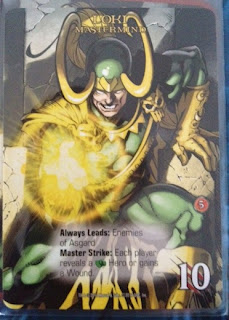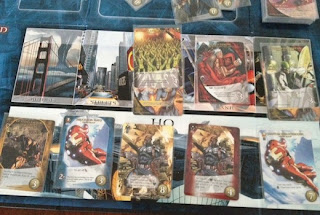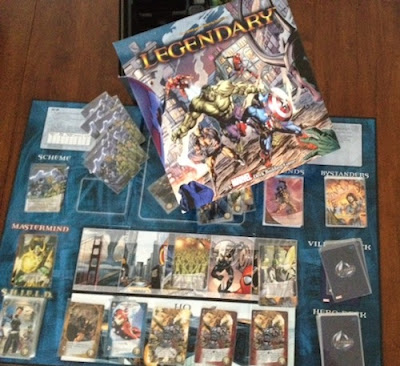One of the games that I've been most eager to try over the last few months has been Legendary: A Marvel Deck Building Game.
In Legendary, you are assembling a team of superheroes in order to thwart a Mastermind (super-villain), and his dastardly scheme! (After all, this is comic book based.) In order to do this, you will create a "villain deck" that contains a few piles of villains, henchmen, bystanders, and scheme twists. You will also create a "hero deck" that contains a few different superheroes. Each turn, you will reveal the top card from the villain deck, and (if it is a villain), then it will push all of the other villains along the board; and then it will be leering at you, threatening the city - and thus a great target for being punched in the face. After flipping a villain card, you will play the cards from your hand in order to purchase more heroes or to attack villains (or the Mastermind). The villains you defeat go into your victory pile, whereas heroes you acquire go into your discard pile (to be shuffled in and drawn later in true deck building fashion). Play continues like this until the heroes have defeated the Mastermind four times or (theoretically) the Mastermind has completed his evil scheme (which basically doesn't happen). After the players defeat the Mastermind, whoever has the most victory points in their victory display is the winner!
So, the first thing that I will mention about Legendary isn't a pro or a con. It is simply this - don't play this game as a cooperative game. When playing games that are semi-cooperative, some people (and by "some people" I mean "I do this, and so I assume everyone else does") are tempted to play the game in a strictly cooperative fashion. For example, I do this with Castle Panic. Don't do this with Legendary!! Basically, the game just isn't hard enough for this to work. Legendary needs to be considered a competitive game with a potential chance that everyone collectively loses. But, really, the game is generally tense at the beginning, but by the end of the game the heroes completely obliterate their foes (in my experience). I have managed to lose this game one time, but it was a fairly artificial loss. The scenario was a countdown - you lose once a certain number of scheme twists are flipped over. And, when playing, I was playing on the hardest combination of settings - with three extra scheme twists and with the Mastermind having five extra strength. So, I simply wasn't able to defeat him before the time ran out (part of this was also due to my selection of heroes). After this, I played another scenario and won easily, with the only threat being that the villain deck might have run out before I had won. (The villain deck is pretty small in a solo game, and if the villain deck runs out, it's officially a "tie".) So, I reiterate - don't play this as a cooperative game. I was very excited that this was cooperative. Don't fall into my trap.
 |
| Loki - with obvious evil intentions |
The next pro that I have for Legendary is that there are two sets of cards available - the villains that you can fight, and the heroes that you can buy. In mechanical terms, Legendary is very similar to Ascension: Chronicle of the Godslayer. (Yes, that is a link to my review of Ascension. And, yes, that was one of my very first reviews, so don't judge it too harshly.) I thought that Ascension was fine, but I was constantly frustrated that the cards that you had to choose from seemed to always be the opposite of what I needed - if I had money, then they were all monsters; if I had the ability to fight, then there weren't any monsters. Legendary has fixed that with something insanely basic - there are two tracks. There are always heroes to purchase (and I mean "real" heroes, not generic upgrades, though a "SHIELD Officer" is also available). There is also at least one villain card that is flipped on the start of each turn - so, generally there is someone that you can fight. (It is possible that a scheme twist or innocent bystander is flipped, in which case you might only be able to fight the Mastermind. That's a rare situation, though.)
Though I really enjoy many of the aspects of Legendary, I still have a few cons. My first one is this - the game is very reactionary. As I have played the game more (I've now played around 7 times), I've realized more and more how much of your strategy is decided for you by reacting to what cards are present. You can hope to have an ongoing strategy, like chaining tech heroes together, but you can only buy what is in HQ on any given turn. And so, at least some of the strength of each player's deck will be based on what cards were available when it was their turn, and if those cards happen to work together. But, the game isn't only reactionary when it comes to purchases - you are also reacting to which villains are threatening the city. There might be turns where you have a lot of fighting power, but the only villains available are enormous, and so your turn is completely unproductive. And the player that follows you may flip up a tiny villain that they can obliterate and get a bonus for doing so. I would like a bit more control over my destiny than I often feel that I have in Legendary (but again, I felt like I had much more control than I did in Ascension).
 |
| Heroes and Villains - living near each other... for now |
Overall, I give Legendary an 8.0/10. I enjoyed the game, and I've honestly played it more than any other game that I've tried recently. Unfortunately, I think that it may be reaching the end of it's gaming lifespan for me (I can't tell yet). I'm actually fairly curious to see what will be added in the upcoming expansions, and whether they will breathe new life back into the game for me.
If you're interested in Legendary, you might also check out Sentinels of the Multiverse, Star Wars: Living Card Game, and Friday: A Solo Adventure.



0 komentar:
Posting Komentar